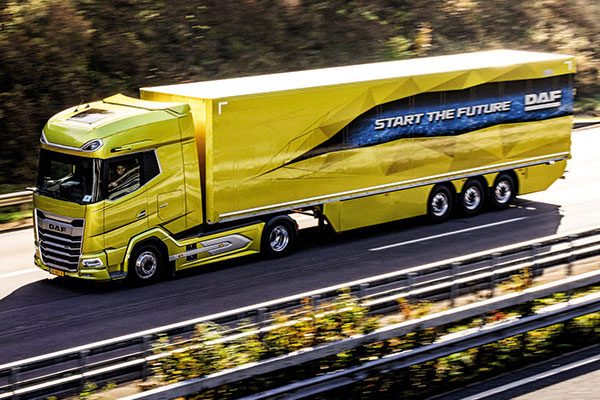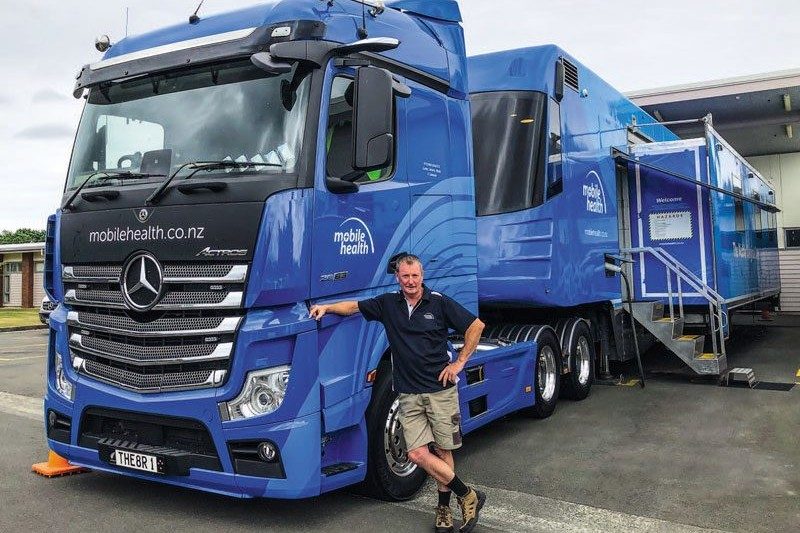ROAD TO SUCCESS THERE FOR THE TAKING

ackground
Like most western economies, for the past two decades or more, New Zealand has had a shortage of class-5 heavy truck drivers. With the freight-task forecast to double between 2017 and 2050 and the average age of truck drivers currently sitting around the mid-50s, the magnitude of the issue confronting the road transport industry, and the economy, is fast becoming biblical.
Trucking is a highly competitive, low-margin industry and there are many reasons for its lack of appeal in wider society, with the main contributors being long hours and absence from home, remuneration, and a lack of formal qualification.
The solution to any or all of these problems won’t come with a silver bullet; this is now a chronic, generational issue.
“The work that the Road Transport Forum (RTF) and others have done reveals that we’re going to have to do some work and get innovative if we want a workforce that looks and feels more like the New Zealanders we serve,” said Michael Wood, the Minister for Transport, Workplace Relations, and Safety.
Te ara ki tua Road to success
Thursday 27 April 2021 has the potential for being a landmark day for the New Zealand Road Transport industry. The RTF officially launched its industry trainee programme, Te ara ki tua Road to success, at the home of Auckland transport operator Carr & Haslam. In attendance were cabinet ministers for social development and employment, and transport, workplace relations and safety, the chair and senior RTF personnel, representation from the three industry associations, a modest number of road transport operators, three programme trainees, and media.
In terms of optimising transport industry operator presence, Thursday wouldn’t be your first choice of days for such an event, but if you want two cabinet ministers in the same place at the same time, that’s what it had to be. However, in terms of what is needed for the industry to help address some its most pressing issues, the timing of Te ara ki tua Road to success could not be better.
“Trucking has an ageing workforce, and we want to bring a new and diverse range of people into the road-freight industry. We want trainees to be clear on a career path and be rewarded for their success,” said Road Transport Forum (RTF) CEO Nick Leggett.
How does it work?
Training is a mix of practical and theoretical components designed to lead directly to qualifications relevant to the industry. Qualifications are in the form of NZQA-endorsed micro-credentials, completed online and delivered through MITO, which has made the micro-credentials fee free until the end of 2021.
Potential trainees register with Te ara ki tua Road to success, either directly or via referral from another initiative, e.g. Kiwi Can Do, or the Ministry of Social Development.
Their application is screened and considered by Te ara ki tua Road to success staff employed by the RTF, and if all goes well, they are matched to a suitable registered transport business and given full-time paid employment as a trainee. Then starts a 12-month engagement between the Te ara ki tua Road to success team, the trainee, and the employer as the trainee progresses through micro- credentials, licence levels and working life. At the end of the year, there’s a graduation and the trainee either secures an ongoing full-time position with their employer or alternate employment is sourced.
Depending on the trainee’s pathway into the programme, there may be government assistance for the employer if the employee is a registered job seeker with the Ministry of Social Development.
Present at the launch were three trainees: Betty Heremia Sola, Liana Manarangi and Shaun Tomai. All three were from the Kiwi Can Do programme and are currently employed by Carr & Haslam.
“Betty, Liana and Shaun arrived well prepared to do the job,” said Carr & Haslam managing director Chris Carr.
“Not to the standard we will be asking them to get to, but certainly to a standard that any education facility could prepare them for. We were dealing with people who knew what they were doing to start with.
“One thing they came with was a great attitude; you can train people, but you can’t train attitude.
“The thing with this programme is the mentoring support that will follow it up so we can all help them maintain that attitude while we increase their knowledge in what we do. And while part of what we do is specialised, the support that comes with these new drivers is such that they will earn and take qualifications away from us that they can take to another job, wherever they go. These are qualifications that will remain with them permanently.”

From left: Chris Carr, managing director at Carr & Haslam; Michael Wood, Minister of Transport, Workplace Relations and Safety; Betty Heremaia Sola, Road to Success trainee at Carr & Haslam; Carmel Sepuloni, Social Development and Employment Minister; Shaun Tomai, Road to success trainee at Carr & Haslam; Liana Manarangi, Road to success trainee at Carr & Haslam; Nick Leggett, CEO of the Road Transport Forum; and Greg Pert, chair of the Road Transport Forum.
They’ve done their bit
“Often there’s a view that young people need to change to fit the workforce. We’re taking the opposite view,” said Leggett. “We recognise that the industry has to change to fit the desires of the modern workforce – that means qualification, structure, on-the-job training, and licence progression, as we are short of willing class-5 drivers in this country. The challenge for our industry is many of you only have class- 5 vehicles, so it’s harder to train, but not impossible if we work together.”
Speaking at the launch, Carmel Sepuloni, the Minister for Social Development and Employment, proved high office was well briefed on the predicament road-transport faced.
“The Road Transport Forum conducted research in 2020 directly with road-freight transport operators. Thirty- five percent of respondents identified a shortage of drivers being a problem for their business, and 53% had a shortage of drivers in the past three years,” she said.
Both Leggett and Sepuloni lauded the collaboration and cooperation between government ministries, agencies, and industry in bringing the traineeship programme together.
“Minister Wood and I were talking before formalities started that we love it when things are joined up, when government agencies work together, and where programmes feed into each other,” said Sepuloni.
Putting aside the mildly unnerving aspects of that comment, the good news is this has all come about without reinventing the wheel to any great extent – something not always easy to pull off when aspirational people are looking for somewhere to put their signature.
Te ara ki tua Road to success, therefore, is both a collaborator of internal and external programmes that already exist – Job Seeker, Kiwi Can Do, and unit standard MITO education – and a facilitator for the people journeying through those programmes into the industry via a trainee scheme.
There have been tweaks within some programmes to make them work – for instance, the micro- credentials within MITO’s unit standards that allow online study within busy lives.
Te ara ki tua Road to success also takes a broad view of the industry, and trainees are fully informed about the world of potential beyond the wheel, from freight-shed floor to boardroom table, a course navigated by many of today’s industry leaders, albeit informally.

“Yes there’s a cost, but what’s the cost if we don’t?” says Carr & Haslam
MD Chris Carr. His company has taken on three trainees and he laid down a
clear challenge to the road transport industry to back the programme.
Will it work?
“This is very much about industry taking the lead and finding solutions to its own challenges,” said Leggett.
If you take the view that the windscreen’s 90% bigger than the rear-view mirror because one’s for looking forward and the other back, Te ara ki tua Road to success appears to be a powerful solution to many issues restricting industry recruitment – access, clarity of pathway, cohesion, and education to name few.
The big risk is industry will not take a moment for a bit of reflection on the past 20-plus years, and won’t invest in the scheme for the benefit of a wider solution. Of course, industry-wide ‘buy in’ is not something the industry is inherently or historically comfortable with. With a human resource crisis approaching its third decade, getting on board with something that ticks all the boxes this does might seem like a no-brainer, but this is an industry known for parochial stances often founded in sector, character, competitive, or inter-regional jaundice.
Hope however might come from the level of industry engagement that’s occurred right from the outset. When names such as Sheldrake, Carr and Pert can be found in the genesis, formulation, and as flag bearers of Te ara ki tua Road to success, real attention needs to be paid by one and all.
“Yes, there’s a cost,“ said Chris Carr. “But what’s the cost if we don’t?”
The answer, then? Yes, Te ara ki tua Road to success is a positive and appropriate initiative that has come about through the sweat and toil of many, including champions from within our ranks who know the industry’s plight first-hand. The biggest hurdle is convincing operators from Cape Reinga to Bluff that the way forward is in fact viewed through the windscreen.
New Zealand is generally regarded as one of the only countries to keep Covid-19 at bay, but would an equally significant contribution to the long-term economic health of the world be that of the country that finally nailed the driver shortage? That potential might be in our industry’s hands.
With an industry-wide scrum, and the success of collaborative programmes such as Te ara ki tua Road to success, we may see a day when our wider society’s first thought – rather than their last – is to leave the toilets and amenities open, when only the truckies are left working.
Chris Carr’s final comment: “A moving truck is a moving economy, and I’d like to congratulate the team at the RTF and MSD for the work they’ve done in getting this programme established. I challenge my fellow operators to now get off their arses.”
Read more
Why all the rollaways?
0 Comments8 Minutes
Jimmy Wilson
0 Comments2 Minutes
DAILY DRIVER
0 Comments9 Minutes





